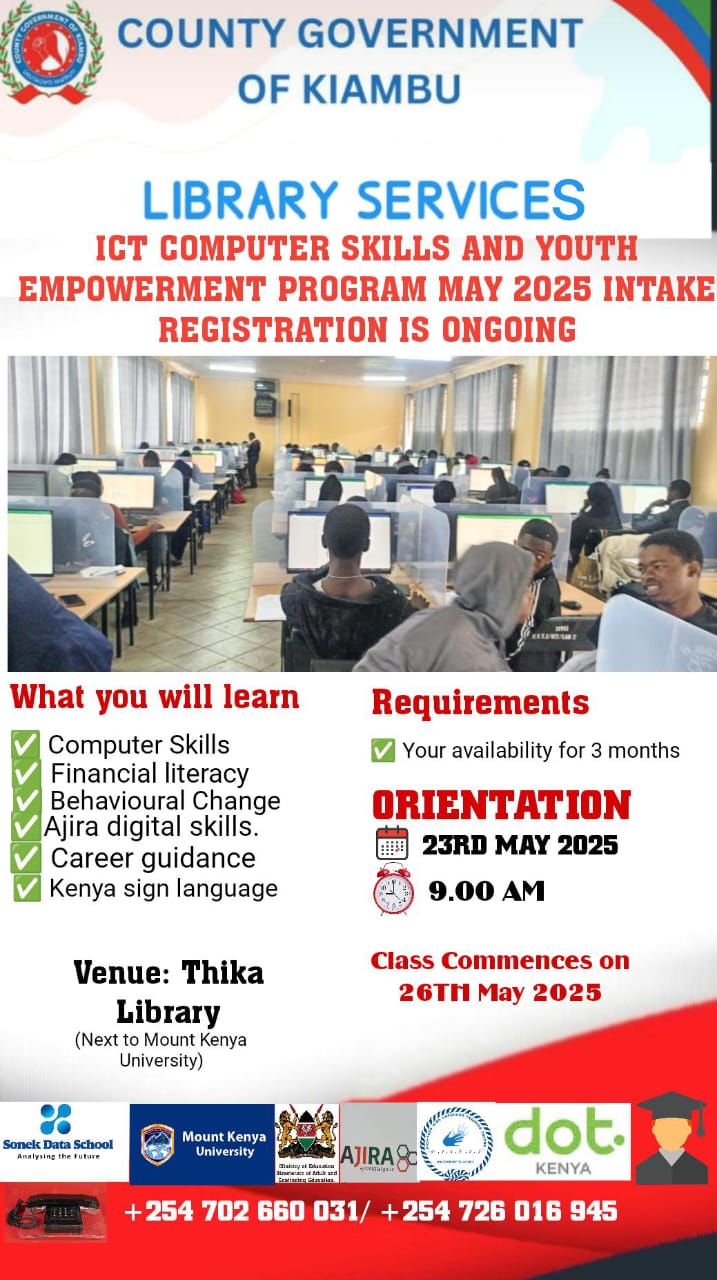Governor Wamatangi seeks to boost annual revenue collection to Sh7 billion in two years
The County Government of Kiambu has embarked on a major revenue enhancement drive which Governor Kimani Wamatangi hopes will boost its annual own source revenue to at least Sh7 billion in two years, without increasing existing fees and levies.
The devolved unit, which has been grappling with low revenue collection, collecting less than Sh3 billion annually, is assembling an enterprise resource planning (EPR) system to integrate all its services to enhance service delivery and revenue management.
Mr Wamatangi has been dispatching all his County Executive Committee Members, Chief Officers and other management team members to monitor revenue compliance in sub counties, with each team expected to present a report to him for action.
The initiative, Mr Wamatangi said presents his administration with an opportunity to interaction with revenue payers to create good customer relations, sensitize them on the need to pay county taxes voluntarily, understand challenges denying county revenue, and motivate and monitor conduct of revenue officers, some of who have been accused of looting.
“This is an opportunity to understand the needs and the challenges of ourpeople, and persuade them on the importance of paying levies and also most importantly, monitor how revenue officers conduct themselves when interacting with clients and managing funds. We have initiated reforms such as turning to technology to eliminate theft of revenue by embracing cashless, being innovative by exploring new tax areas, and coming up with targets and tracking systems on a regular basis,” Mr Wamatangi said, noting that the exercise will also enable him establish his county’s own source revenue collection target.
In this financial year, administration had envisaged to collect Sh4.1 billion but Mr Wamatangi has since revised the figure upwards to Sh5 billion but his target, he says is at least Sh7bilion of the possible Sh11.3 billion in the next two years.
The county has been collecting between less than Sh3 billion per year.
Environment CECM David Kuria said during the exercise, established rampant cases of non-compliance and weak systems that lead to non-collection of revenue and theft.
“The governor is keen on creating and sustaining a good relationship with revenue payers, no harassment of traders, but will instead support them to thrive. We have established that we will need to work on revenue for our systems and support our officers, which is already in progress. We have also established a massive loss of revenue because some of us (county officers) are honest and this will be addressed,” the county minister said.
The last county assembly House Committee on Finance and Economic planning county, in an audit, revealed that the county has been losing millions daily from building permitting, quarry fees, cess, car parking and other daily charges through massive theft orchestrated by their respective officers and inadequate cash collections systems.
From the car parking revenue, the county, the report said it collects 40-50 percent which comes to around Sh400 million per year, quarry cess (45 percent) while from the building permits, only 15 percent is realized.
For instance, during the probe, the 17-member team made two visits to the Bob Harris Road cess collection point at Ndarugu in Juja alone, where they establish the in one the collecting point alone, the county was losing over Sh100, 000 per day, translating to an upward Sh3 million per month.
A study released in October last year dubbed: “Comprehensive Own Source Revenue Potential and Tax Gap Study on County Governments” suggested that counties are losing up to Sh185 billion in own source revenue annually due to outright corruption, weak tax collection systems and tax evasion, among other vices, whereby they collect a paltry Sh31 billion against a potential of Sh216 billion.
The counties, according to the study, can collect Sh32 billion from hospital and public health services fees, trading licenses (Sh23 billion), natural resources and transportation (Sh16 billion), property rates (Sh14 billion) parking (Sh8.5 billion), agriculture transportation (Sh7billion), administrative charges (Sh5.8 billion), environment and conservancy administration fees (Sh5 billion) and Sh4.6 billion from technical services.
Further, counties can realise Sh4.6 billion from market trade center fees, liquor licensing fees (Sh4.4 billion), building plan approvals Sh3.7 billion), game park and reserves (Sh3.7 billion) and Sh800 million from fines and penalties.








